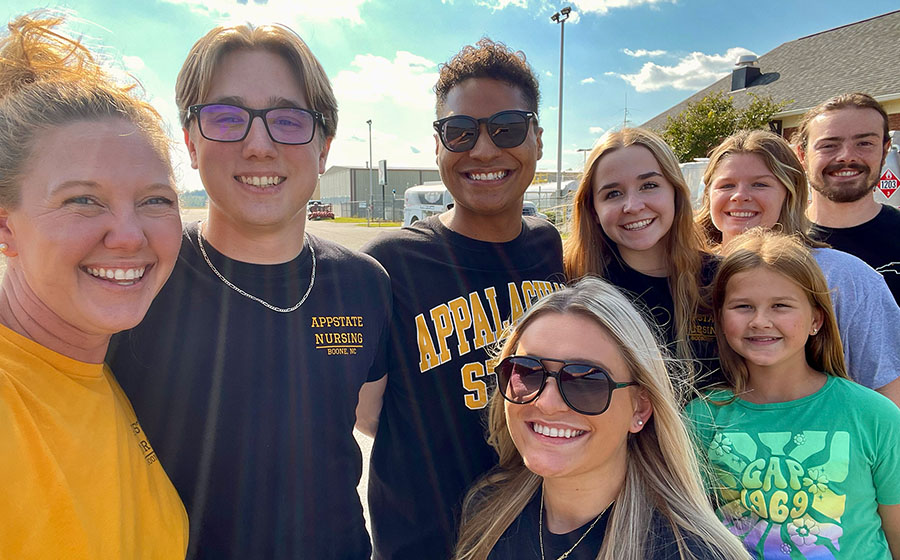
Dr. Amber Welborn, assistant professor in App State’s Department of Nursing, led a group of students who volunteered to sort medical supplies to be delivered via aircraft at the Lincolnton-Lincoln County Regional Airport. Pictured from left to right in the back row are Welborn, senior nursing major Jesse Gargis, senior exercise science major Noah Foy, senior nursing major Caitlyn Moore, senior nursing major Ella Pyatt and senior nursing major Eli Dowler. Shown from left to right in the front row are senior nursing major Morgan Haines and Welborn’s daughter Olivia. Photo submitted
BOONE, N.C. — Hurricane Helene left a lasting impact on the High Country when it hit on Sept. 27, causing widespread and unprecedented flooding, landslides, power and internet outages, and significant destruction, including washed-out roads, downed trees and damaged homes and businesses.
In the wake of the historic and devastating storm, Appalachian State University students, faculty and staff stepped up to help those in need — both on and off campus, and during and after the disaster. From rescues to relief to recovery, Mountaineers have been a part of every stage of the hurricane response. These are just a few of many incredible stories.
Students helped each other — and their High Country neighbors
Riley Edwards' construction internship put him on the front lines of response
Riley Edwards’ internship with Bigfoot Builders put him on the front lines of a natural disaster response in the days after Helene devastated the High Country. Edwards — a senior building sciences-construction management major from Colfax who is a member of the App State wrestling team — has been working with the Boone-based construction company since the summer.
Bigfoot Builders rallied its workers together to transport supplies and begin rebuilding areas in Avery and Watauga counties that were significantly impacted by the hurricane. As soon as Edwards was able to join in on the action, he got to work — and he didn’t stop working for a week straight.
“I was probably working 10 to 12 hours a day, helping out however I could,” he said.
Edwards said, in the early stages, Bigfoot Builders’ main focus was to deliver supplies to those in need, with one of the top priorities being the Fall Creek Volunteer Fire Department in Elk Park.
“Their road probably had a 200-yard section that was just gone,” said Edwards. “There was no way to get to that fire department, so we had maybe a dozen of us on side-by-sides, just so we could bring them a bunch of supplies.”
The next day, with help from about 40 volunteers, Bigfoot Builders sent a grading crew to begin road work at the site. Simultaneously, teams were dispatched to Cove Creek to check on houses and deliver supplies to areas inaccessible by most vehicles.
“One of the Cove Creek residents … we found out his driveway was gone and he had no power, and a mudslide took out his barn and woodshop. Throughout the week we were checking on him, bringing him supplies and working on his driveway,” Edwards said.
Edwards shared that Bigfoot Builders launched a GoFundMe, raising over $10,000 for supplies by Oct. 21, while his personal Amazon wish list brought in an additional $1,000 in donated supplies. He also made daily Facebook posts to spread the word, crediting family and friends for their strong support.
“I was really moved, seeing how many people were willing to help, especially to work on the outskirts of Boone where people lost everything,” he said. “Even those who were most affected were super thankful. It was really special to see the community come together.”
Edwards plans to work for Bigfoot Builders full time after he graduates in spring 2025.
Cait Kinnamon organized resources and recruited volunteers
After a brief power outage in App State’s Mountaineer Hall, Cait Kinnamon, a resident assistant, said she began to understand the extent of the storm’s impacts across Western North Carolina. That’s when the senior environmental geology major from Winston-Salem put her organizational skills to work.
“It didn’t affect us too much on campus,” she said, “but by Saturday afternoon is when we started to realize just how bad this really was, especially outside of town.”
Kinnamon said she initially learned about the need for water, which quickly grew to include supplies such as food, diapers and chainsaws. In response, she created a spreadsheet to organize resources and recruit volunteers, which she shared on her social media pages.
“The sheet had tabs for people to know where to get donations, find shelter or find food,” said Kinnamon. “I also had a volunteer tab and tabs for people who could help with chainsaws and other specific needs — I tried to cover a little bit of everything.”
Kinnamon received an overwhelming response to her spreadsheet, with messages filtering in from across the state.
“Seeing the community come together was really beautiful,” she said. “It’s times like these that everyone can put their differences aside and just be there for one another.”
Kinnamon put her own hands to work as well, participating in a week’s worth of volunteering at a variety of sites, including Casting Bread food pantry in Blowing Rock, the distribution center at The Summit pickleball courts in Boone and the distribution center at Jimmy and Jean’s Family Entertainment and Arcade in West Jefferson.
Kinnamon also checked in on her fellow students and faculty members in the Department of Geological and Environmental Sciences, making personal supply runs for students and helping a professor clean up after a landslide on their property.
“I do all of this because I want to have a more meaningful experience with where I live,” she said. “I’m not just here to go to school — I’m here to be a part of this community.”
Faculty lent their expertise to respond to specific needs
Dr. Kelly Clark’s student and faculty team tutored local schoolchildren
Many App State faculty members pitched in to help with hurricane response and recovery, often lending their expertise to fill specific needs in the community. Dr. Kelly Clark, assistant professor in App State’s Department of Child Development, Literacy and Special Education, led a group of faculty and students who provided tutoring support at Hardin Park Elementary School — one of the locations that offered free child care while local schools were closed.
“I was thinking about how families and children with disabilities might not feel like they could bring their child if there were not enough volunteers with a special education background,” said Clark. “I was also thinking about how teachers and administrators have a lot on their plates and that this might be something we could do to help.”
Clark noted that local elementary schools have always welcomed App State students for internships and student teaching, making this a meaningful opportunity to give back. Fellow App State faculty members Dr. Daniel Poling and Dr. Angie Harris, both assistant professors in the Department of Child Development, Literacy and Special Education, joined the cause, as well as nearly 10 App State students majoring in special education and elementary education.
“It was so rewarding to see our students volunteering,” said Clark. “They were so great and willing to do anything. It made me proud, as their professor, to see them in action, and I also loved that I got a chance to volunteer alongside them.”
Olivia Wasson, a junior elementary education major from Williamsburg, Virginia, volunteered at Hardin Park for two days with first grade students, assisting lead teachers however she could.
“Being an elementary education major, I knew that my education could be put to use to lighten the load for teachers under these stressful and unpredictable circumstances,” said Wasson. “I got to see what it meant to be resilient, and I felt a strong sense of community. I loved getting to see how the Hardin Park staff and faculty stepped up to provide this space and support for children and families from all over Watauga County.”
Gabbe Jennings, a senior special education major from Ferguson, volunteered for two days with first through fourth grade students, where she helped with various arts and crafts, music classes and social and emotional learning.
“I missed being with my students immensely,” said Jennings. “As soon as I heard about the volunteering opportunity, I knew I wanted to be with the kids again, and I was so thankful for the kids who were able to come.”
Dr. Jeremy Ferrell and students put sustainable technology into action
Dr. Jeremy Ferrell, associate professor in App State’s Department of Sustainable Technology and the Built Environment, completed a timely project with his students that provided a neighborhood with electricity during a 10-day power outage.
Each semester, Ferrell’s capstone class works on a community project, and this semester’s project was to install an off-grid photovoltaic (PV) system in Triplett. The installation was finished on Wednesday, Sept. 25 — two days before the storm hit.
“The timing was remarkable,” said Ferrell, adding that it’s not often that a school project makes such an immediate impact like this. “Everyone who worked on it was really pleased to be able to make a difference,” he said.
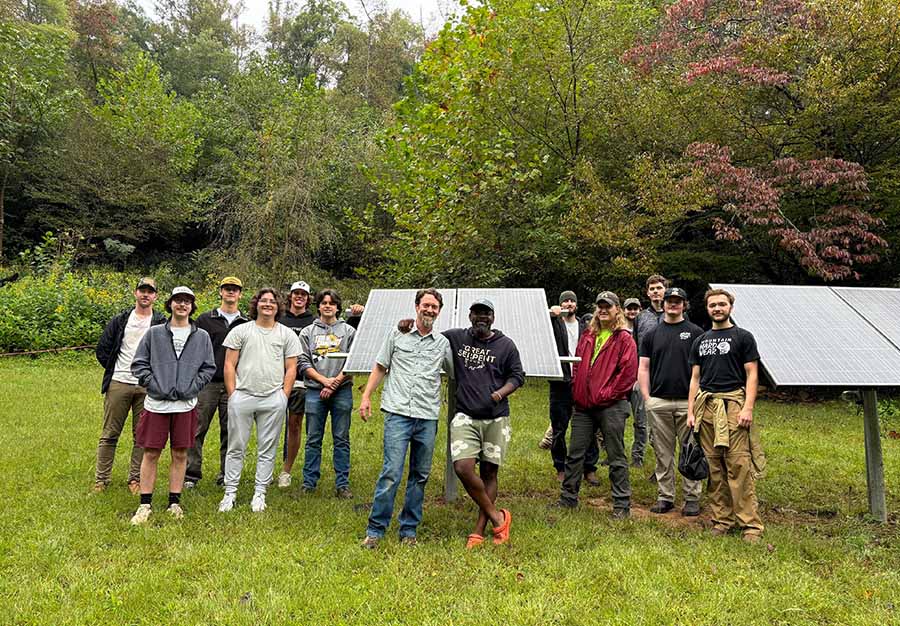
Dr. Jeremy Ferrell, associate professor in App State’s Department of Sustainable Technology and the Built Environment, center left, poses with community partner Tommy Lee, center right, and Ferrell's students at a recently installed off-grid photovoltaic (PV) system in Triplett. The system, which was installed as part of a class project, provided electricity and communications to a Triplett neighborhood while the power was out after Hurricane Helene hit the area. Photo submitted
Ferrell explained that an off-grid PV system is a solar-powered, battery-based system independent of the electric grid, which is unaffected by outages if sunlight is sufficient and energy is properly managed.
Ferrell said the system was able to provide electricity for essential items such as phones, laptops, lights and a Starlink for internet.
“Triplett was certainly cut off by road for the first couple of days after the storm and didn’t have power for about 10 days total, so I know anyone who was in the area and could use these resources was very grateful,” Ferrell said.
Ferrell said this has been a rewarding experience for him and for his students, who are passionate about sustainable technology.
“I thought it really showcased what renewable energy can do and how it can rise to the occasion in really difficult times like disaster response,” he said. “It makes me think that there’s a lot more we can do to prepare for future events and future outages.”
Dr. Amber Welborn and students organized medical supplies for field hospitals
Dr. Amber Welborn and a group of her students helped organize trauma kits and medical supplies to be flown to areas in need after Hurricane Helene. Welborn, an assistant professor in App State’s Department of Nursing, noted that physical barriers often hindered vehicle delivery of medical supplies, particularly in remote areas of Western North Carolina, prompting a push for local pilots to transport supplies by air.
“As word got out that pilots were becoming available, people who were managing field hospitals were calling for all sorts of things, from insulin to prescription medicines,” said Welborn. “With so much random stuff being donated and collected, there were requests for nurses who knew what this stuff was and knew what needed to go together in the most useful and organized way.”
Welborn agreed to volunteer at the Lincolnton-Lincoln County Regional Airport, which was one of the medical supply pickup locations for local pilots. Welborn put out a call to her nursing students, and said that within an hour, seven students offered to volunteer with her. They would collectively go on to work, on and off, for about two weeks.
“To be able to see my students and know they were safe made me so happy, and to know that they wanted to be there to help — that’s the kind of work ethic I can’t teach,” said Welborn. “It makes me so proud of them and to know that they’re going to be good nurses.”
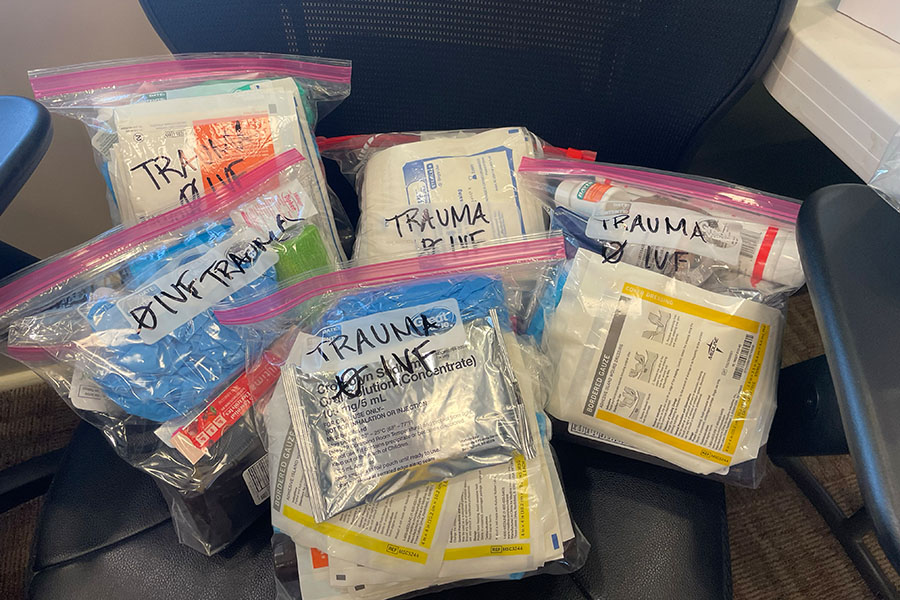
Dr. Amber Welborn, assistant professor in App State’s Department of Nursing, along with a group of her students, volunteered to sort medical supplies to be delivered via aircraft at the Lincolnton-Lincoln County Regional Airport. Pictured are several trauma kits that were put together to be flown to areas in need after Hurricane Helene. Photo submitted.
Welborn said the experience also served as an educational opportunity.
“We used critical thinking to put together these trauma kits,” she said. “One example is you can’t send alcohol on an aircraft because it’s flammable, so we had to switch out all the alcohol with peroxide. There’s also a huge IV shortage right now, so we needed to label these kits very clearly to show that there are no IV fluids, so they aren’t wasting time digging for that.”
Welborn added that a local agency donated over 100 glucometers for testing blood sugar, but they are brand-specific, so students had to go through and make sure all of the working pieces were in order before clearing them to be delivered.
“It took me back to some of my best nursing memories from when I was in public health, maybe 15 years ago,” said Welborn. “To be able to provide immediate help like this — that’s the kind of nursing that I love.”
Welborn said her 10- and 14-year-old daughters were able to help out and be with her while she volunteered, making this an even more meaningful experience.
Staff members volunteered on and off campus
Ryan Kennedy ’22 provided disaster relief support to campus community
The App State Disaster Relief Hub opened in the Plemmons Student Union on Oct. 1, providing students, faculty and staff with resources and support after Helene, including financial assistance through the App State Disaster Relief Fund.
Alumnus Ryan Kennedy ’22, an administrative assistant in the Department of Psychology, volunteered at the hub for nearly three weeks, assisting with a variety of tasks, including checking people in and out, helping people fill out forms and paperwork, and organizing and filing documents.
“I wanted to help out,” he said. “I know I’m good with paperwork, numbers, organizing and getting things processed, because that’s basically what I do all day at my job, so it was nice to be able to help in that way.”
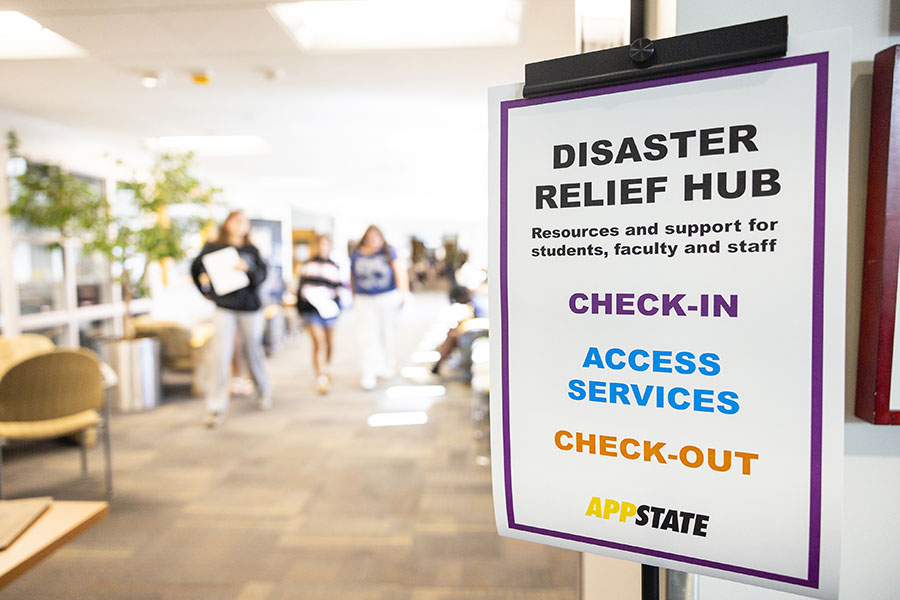
The App State Disaster Relief Hub opened in the Plemmons Student Union on Oct. 1, providing students, faculty and staff with resources and support after Hurricane Helene, including financial assistance through the App State Disaster Relief Fund. Alumnus Ryan Kennedy ’22, an administrative assistant in the Department of Psychology, volunteered at the hub for nearly three weeks. Photo by Kyla Willoughby
Kennedy said he was a student worker for three years in the Plemmons Student Union and that he has worked closely with Case Management and other offices who were on-site at the hub to offer support.
“Being a recent graduate and having made these connections in the student union is what drew me to the Disaster Relief Hub,” he said. “In a way, it still feels like home.”
Kennedy added that during the COVID-19 pandemic, he was a recipient of relief funds himself, so it felt like a great opportunity for him to give back.
“Working at the Disaster Relief Hub, it was hard at times to see people who needed help in their raw and emotional state,” he said, “but there were also quite a few moments where you got to see people reunite after not being in contact with anyone for days. It was the unknowing of it all that was the most terrifying for everyone, so to observe people coming together was pretty special.”
Juliana Phillips ’21 gave back to local farms and families
App State alumna Juliana Phillips ’21 is a lead preschool teacher at the Lucy Brock Child Development Laboratory — an early childhood learning center housed in App State’s Reich College of Education.
One of the missions of Lucy Brock is to serve local, fresh foods to its students and staff, which is made possible through partnerships with various farms. A recent Chancellor’s Innovation Scholars Program grant allowed the school to create a local Farm to Early Childhood Education program, which inspired Phillips to give back to the farming community after Hurricane Helene damaged crops and farmlands throughout the region.
“Local farmers have been so supportive to us, that it just felt right to help them out in any way that I could,” she said.
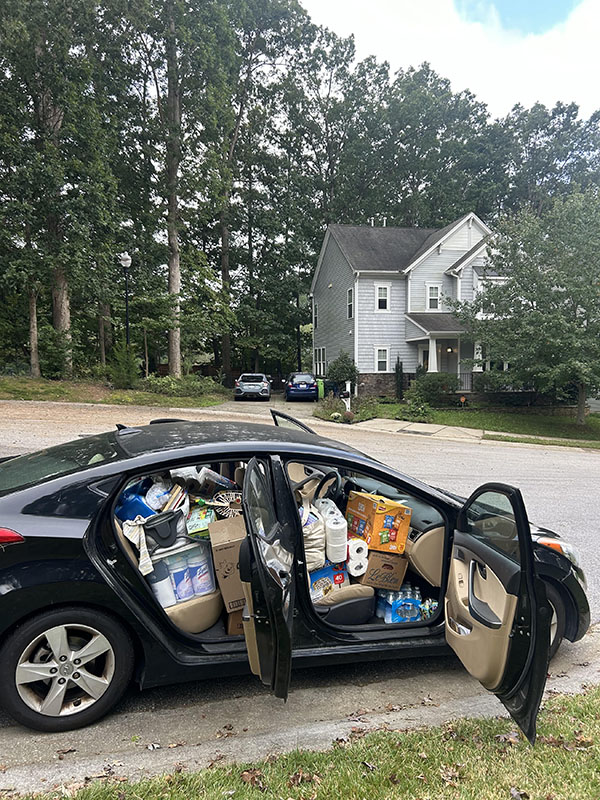
Juliana Phillips ’21, a lead preschool teacher at App State’s Lucy Brock Child Development Laboratory, made a donation pickup in the Raleigh area, delivering the collected supplies to the Hunger and Health Coalition in Boone, the Children’s Council of Watauga County, the Valle Crucis Conference Center and local families in need. Photo submitted
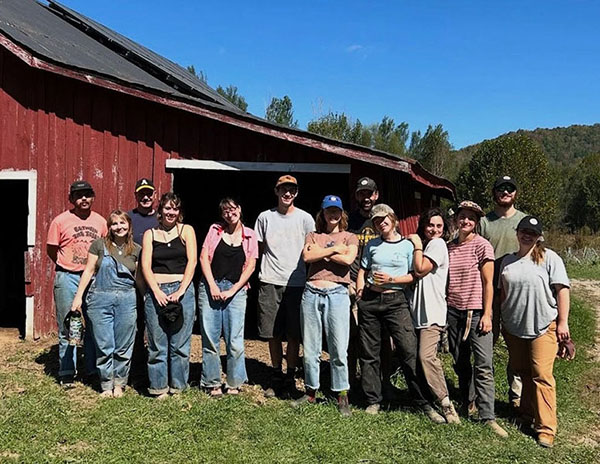
Juliana Phillips ’21, a lead preschool teacher at App State’s Lucy Brock Child Development Laboratory, fourth from right, with a group of volunteers at Sleepy Bird Farm in Valle Crucis. Phillips spent a week volunteering at multiple farms across the High Country after Hurricane Helene hit the area. Photo submitted
Phillips spent a week volunteering at multiple farms, including Boone Fungi, Sleepy Bird Farm in Valle Crucis, Springhouse Farm in Vilas and Full Moon Farm in Triplett. She served in a variety of capacities, performing tasks that ranged from muck removal, to harvesting salvageable crops, to repairing broken fences for cows.
“It’s given me so much insight into how important the farming community is and how much support they give one another,” said Phillips. “They lost so much and still made it a point to give back to everyone who volunteered, whether it was cooking us meals or sending us home with herbs, or eggs, or jam. It was really beautiful to witness.”
On top of her work at local farms, Phillips also made time for a donation pickup in the Raleigh area, where she is from originally. She said she put a call out for supplies on her Instagram page, and that it resulted in an overwhelming response.
“I had people from my high school — people I haven’t talked to in a really long time — reaching out and saying they wanted to help,” she said, adding that one of her friends made a delivery all the way from Atlanta.
Phillips said she collected enough supplies to disperse items to the Hunger and Health Coalition in Boone, the Children’s Council of Watauga County, the Valle Crucis Conference Center and local families in need.
“It was really touching to get such a great response from people all over the state and even farther away,” she said. “Even though we all struggled with a lot of sadness and grief, the community coming together felt like the silver lining. These little acts of kindness went such a long way.”
What do you think?
Share your feedback on this story.
Dr. Lee Barnes ’90 catalyzes support for students, faculty and staff impacted by Hurricane Helene
‘Unified approach’ key to recovery, says Boone mayor
About Appalachian State University
As a premier public institution, Appalachian State University prepares students to lead purposeful lives. App State is one of 17 campuses in the University of North Carolina System, with a national reputation for innovative teaching and opening access to a high-quality, cost-effective education. The university enrolls more than 21,000 students, has a low student-to-faculty ratio and offers more than 150 undergraduate and 80 graduate majors at its Boone and Hickory campuses and through App State Online. Learn more at https://www.appstate.edu.
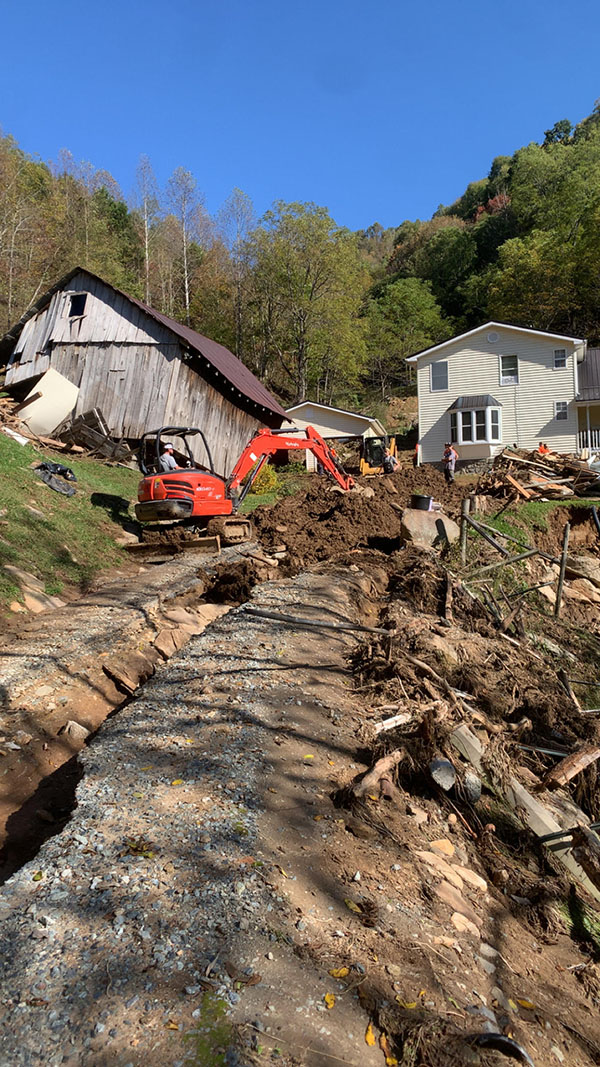
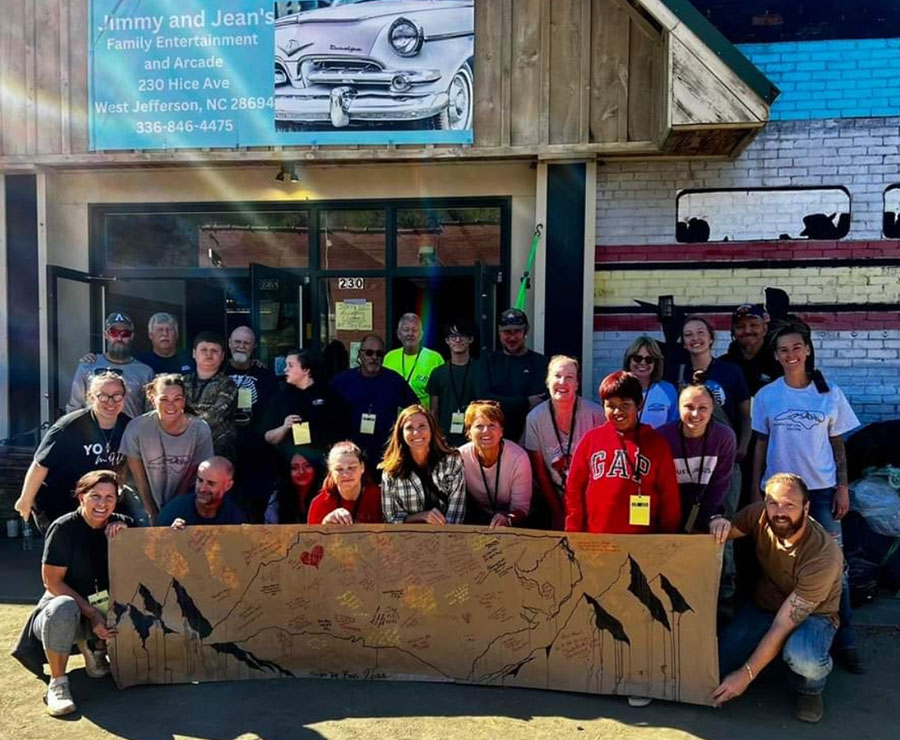
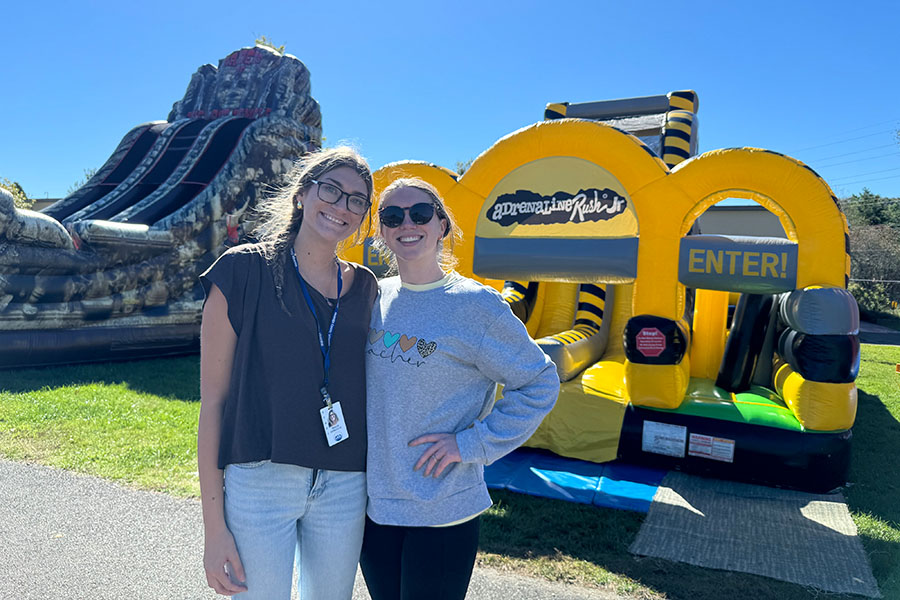
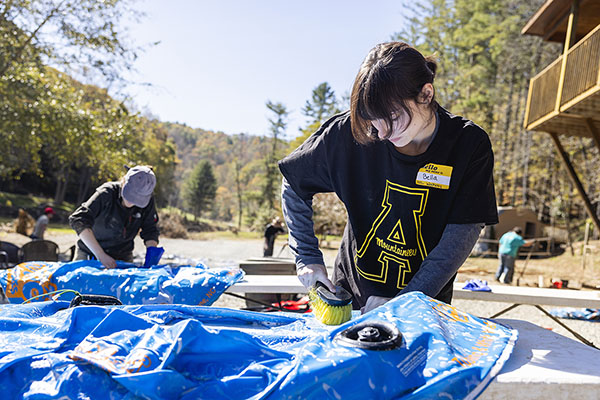
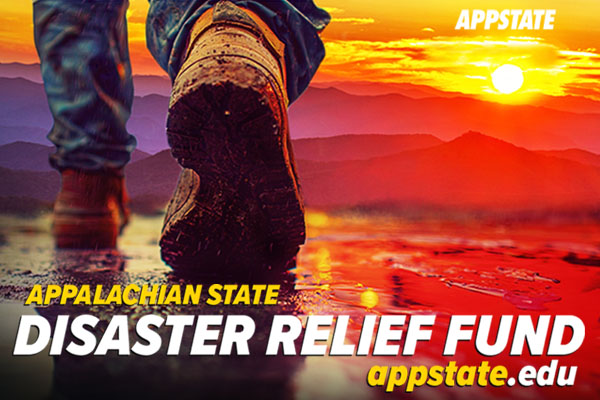
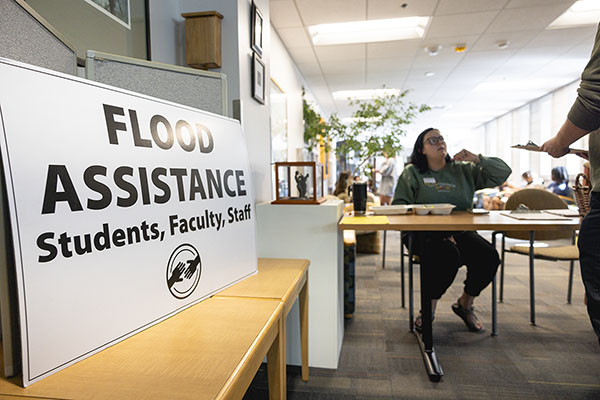
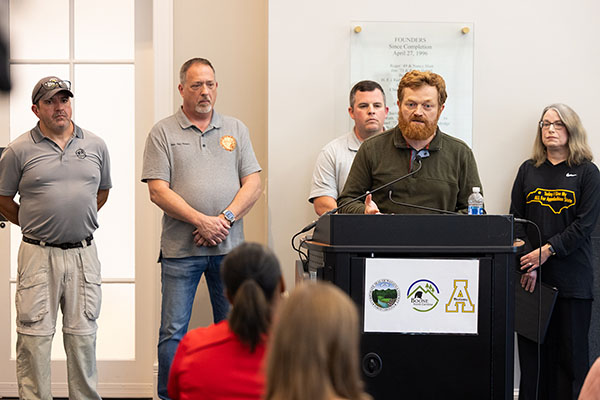
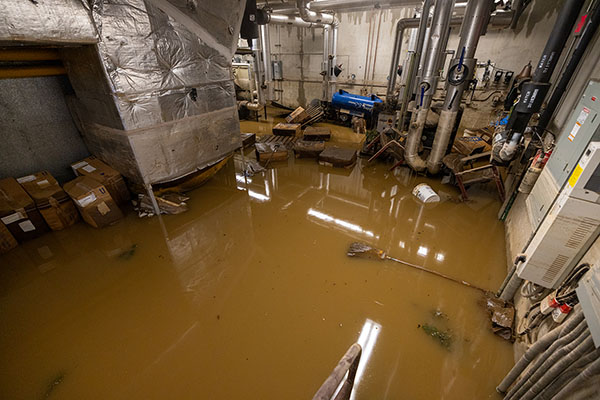


![How NCInnovation Is Rethinking Economic Development in North Carolina [faculty featured]](/_images/_posts/2026/02/rethinking-economic-development-600x400.jpg)








